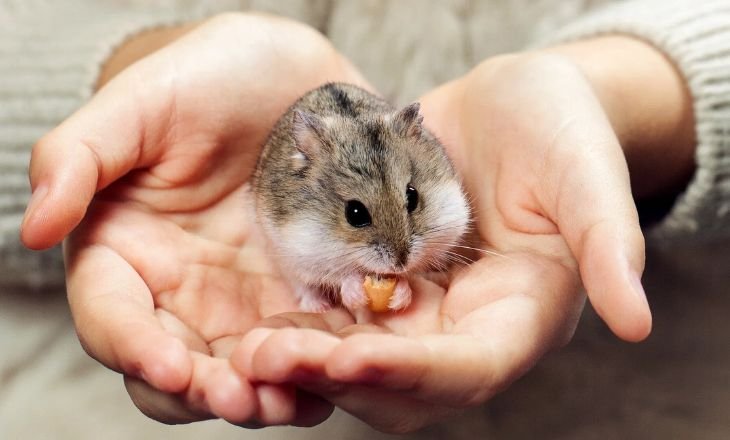Do you like hamsters? These small, furry pets are cute and lovable. But have you ever thought about How Long Do Hamsters Live? In this article, we explore the lifespan of hamsters, including what affects how long they live and how you can help your pet live a long and happy life.
Hamster Lifespan
Hamsters are popular pets because they are small, cute, and have funny behaviours. But one thing to remember is that they don’t live very long. Most hamsters live for about 2-3 years when kept as pets.
This short lifespan can surprise new hamster owners who thought their pet would be around for longer. Even though they don’t live long, hamsters have a lot of personality. They are very active and love exploring their surroundings with excitement and curiosity. Their energy and love for life make them fun to watch and play with.
It’s sad to say goodbye when they pass away, but the love and companionship they give us during their short lives make every moment special and unforgettable.
How Long Do Hamsters Live As Pets
Hamsters are small and playful pets that usually live for two to three years. Some can live longer with good care. Genetics, diet, exercise, and living conditions affect how long they live. Different types of hamsters have different lifespans. For example, Syrian hamsters live around two to three years, while dwarf hamsters can live up to four years.
Pet owners should watch for signs of sickness or old age and take their hamsters to the vet when needed. The bond between a pet owner and their hamster is special, even though hamsters don’t live as long as cats or dogs.
Enjoying time with these cute animals and providing a loving home can make it easier when they pass away.

Is A Hamster A Rat?
Hamsters and rats may look alike but are different species with unique traits. Hamsters are smaller and have round bodies, short tails, and cheek pouches for food. Rats are larger, with longer bodies, tails, and big ears.
Hamsters prefer being alone, while rats are social animals. Hamsters are calm pets that like to explore in their cages. Rats are smart and can learn tricks and solve puzzles.
Do Pet Hamster Smell
Pet hamsters can sometimes smell, but they don’t have to. Keeping their cage clean and choosing the right bedding can help. Giving your hamster enough space to play can reduce stress and prevent them from marking their scent.
Are Hamster A Good Pet?
Many people like hamsters as pets because they are small, easy to take care of, and cute. Even though they are tiny, hamsters can be fun to watch and play with because they are curious and playful. Taking good care of hamsters is important to keep them healthy and happy at home.
Do Pet Hamster Bite
Many people think pet hamsters bite a lot but usually only bite when scared or threatened. Hamsters may bite if they are handled too roughly or feel trapped. With proper care and training, most hamsters can learn not to bite. Pet owners should bond with their hamsters and be gentle and positive when interacting with them.
Are Hamster Friendly?
Hamsters can be affectionate by nibbling and cuddling. They like their own space and may not always want constant attention. With proper care, they can bond with their owners and be friendly. Being patient, respecting their space, and building trust is essential.
How To Take Care Of A Hamster
To keep your hamster healthy and happy, give them a balanced diet with fruits, vegetables, seeds, and pellets. Avoid sugary treats and use chew toys for dental health.
Clean the cage regularly by changing the bedding to prevent odours and bacteria. Keep your hamster mentally stimulated with tunnels, hideaways, and exercise wheels for activity and fun.
How To Take Care Of A Hamster Cage
To keep your hamster healthy, clean its cage weekly by removing dirty bedding and adding fresh bedding. Spot-clean regularly to remove waste and uneaten food. Also, give your hamsters toys like tunnels, wheels, and chew toys for entertainment.
Rotate these toys to prevent boredom and keep your hamster active. Check the room’s temperature and humidity where the cage is placed to ensure a comfortable environment for your hamster.
Are Hamster Loyal
Hamsters are loyal pets, surprising us with their dedication. While not as social as dogs, they form strong bonds with their owners. Hamsters remember their owners and seek their attention. They show distress when separated from them.
Weight
It’s essential to know your hamster’s weight for their health. Hamsters come in different sizes and weights, so watch for sudden changes. A healthy hamster should feel firm but not too heavy when held.
Adult Syrian hamsters typically weigh 4 to 7 ounces, while dwarf hamsters may weigh 1 to 2 ounces. Regularly checking your pet’s weight can help detect health problems early. Sudden weight gain or loss in your hamster could indicate dental issues, parasites, or diabetes.
Colors
Hamsters come in many colors, each unique and beautiful. They can be golden brown, black and white, or rare colors like sapphire blue or fiery red. The variety in hamster colors reflects their genes. Breeders have created new colors and patterns through careful breeding, giving pet owners many options.
Do Hamster See Color
Researchers are debating whether hamsters can see colors. Previous beliefs said they only saw in gray, but recent studies suggest they may have limited color vision. Hamsters have a few cone cells in their eyes that detect colors.
The full extent of colors they can see is not completely known. Some experts think they can see blue and green but not red or yellow.
Hamster Teeth
Hamster teeth are essential for their health. Unlike humans, hamsters’ teeth keep growing. They need to chew hard things to keep them from getting too long. Hamster teeth are strong and can easily chew tough things.
They have enamel only on the front, which keeps their edges sharp. Hamster incisors can grow up to 12 inches a year. This fast growth helps keep their teeth at a reasonable length. Knowing about hamster teeth can help owners care for their pets’ dental health.

Conclusion
The lifespan of a hamster can vary depending on factors such as breed, genetics, diet, and care. On average, hamsters live between 2-3 years in captivity, with some species like the Roborovski hamster living slightly longer. Proper nutrition, a clean environment, and regular veterinary check-ups can help extend a hamster’s lifespan.
Understanding the needs and behaviors of these small pets is essential to ensuring they live a long and healthy life.
Responsible ownership and care are key to maximizing your time with your furry companion. Make sure to offer them love and attention throughout their lives.
Nubian Saanen Cross Goats steal the spotlight in our goat kingdom. Uncover a diverse world of goats with us today.
Frequently Asked Question
Do Hamsters Have Breeds?
Hamsters have different breeds, including Syrian, dwarf, and Chinese hamsters.
Are Hamsters Born With Hair?
Yes, hamsters are born with a thin layer of fur.

